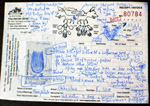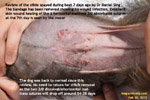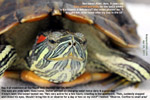On Nov 18, 2011, he had consulted Vet 1 who noted "vaginal/uterine" prolapse and advised spay. She informed him there could be pyometra. She recorded that he declined blood testing. He did not want surgery as the vet warned of high anaesthetic risk. So he took some medication.
However, his dog did not eat again. Four days had passed. Vet 1's Nov 19 blood test records showed elevated liver enzymes and marginal elevation of WBC (Total WCC 17.2). Her ultrasound showed mainly liver, gall bladder and kidney issues. Urine tests showed presence of glucose (3+), blood (4+), bacteria (2+), epithelial cells, WBC and RBC. However, in my retrospective review today, of the differential count, neutrophils was 88% (high) and platelets 181 (200-500) was low. There was a bacterial infection in progress.
The owner wanted non-surgical treatment when he heard about the high risks of death on the operating table. But there was none. Surgery was the option but highly risky as the dog had been sick for some days.
I had been doing Caesarean sections for breeders around 2005-2007 and had done some for his Chihuahuas. Now, he wanted me to perform the surgery which was done on Nov 27, 2011.
I got a blood test done on Nov 25. This time the Total WCC was 33.2 (6-17), Neutrophils were 96%, platelets 14 (200-500). NOW, the haemoglobin was 5.3 (12-18) and red cell count 2.7 (5.5 - 8.5), Haematocrit 0.15 (0.37-0.55), MCV 55 (60-77) indicated severe anaemia too. Platelets were 14 - clotting problems exist now - dog would be unable to clot when the tissues are cut. Now we had a blood stream infection.
With intensive pre and post-op nursing, this dog survived the anaesthesia and long surgery. The surgery took 1.5 hours as there was much bleeding due to low platelet count. I usually perform a normal spay in a Chihuahua in less than 30 minutes. It was a surprise that this old dog could survive such a long anaesthesia. Blood transfusion was advised but this was not possible owing to economic reasons.
CONCLUSION
1. Spaying the dog when
she was young would not have caused this serious health problem.
However, this was a home-breeder who prefers dogs not to be
sterilised as normal dogs should not lose their reproductive
organs. This is the thinking of many young Singaporean dog
owners too.
2. Often the owner is not aware of the seriousness of the
problems as the vet mentioned "high risk" and death likely. Some
delay in seeking a second opinion. Others go to another vet.
3. The first vet was not able to communicate the need for prompt
surgery (1-2 days on Nov 19 , not wait longer) as delays would
make survival very low. It is possible he has no confidence in
this vet's skills but he also did not bother to seek a second
opinion till the dog got more ill.
Other cases
Vaginal hyperplasia and prolapse








 Toa
Payoh Vets
Toa
Payoh Vets